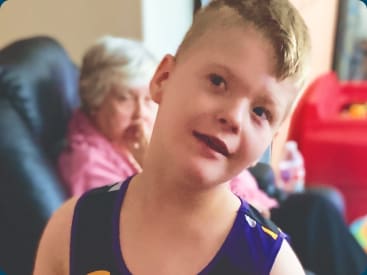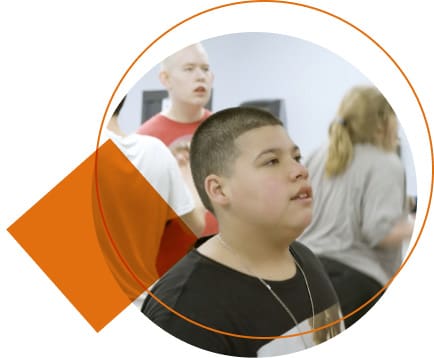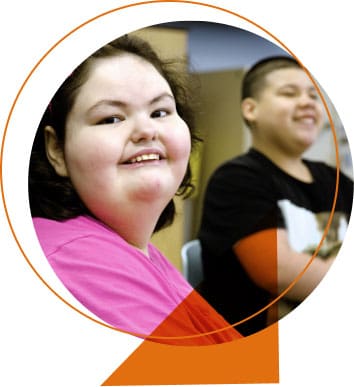
An inpatient program for children with Prader-Willi Syndrome and other weight-related disorders.
Search no further for inpatient obesity treatment.
Young people with Prader-Willi Syndrome (PWS) face significant obstacles that impact every aspect of life. The challenging behaviors, excessive weight gain, food-seeking tendencies, and learning difficulties associated with PWS and other conditions can leave children and caregivers feeling overwhelmed.
In the Jump Start Program, we offer a structured, inpatient environment in which children receive the medical care, support, and guidance they need to reach weight loss and overall health goals. Using evidence-based medicine and recognized outcome measurement tools, we address both behavioral and medical needs. Nexus helps children live more active, healthy lives, because we’re passionate about mending minds.
Changing lives with remarkable outcomes.
1,679 total pounds lost in 2024
100% of patients met their weight loss goals in 2024
15.79% average BMI decrease for discharged patients in 2024
Check out the following video to learn more about Nexus’ Jump Start Program.
Treating behavioral challenges, obesity, and weight-related medical complications.
When a child’s behaviors or rapid weight gain put their health at serious risk, outpatient care alone may not be enough. The Jump Start Program provides a safe and supportive inpatient environment where children can receive the focused attention and structure they need, especially when other approaches haven’t worked.
Program features:
- Ages 7 up to 21
-
Interdisciplinary team, including family physicians, psychiatrists, dietitians, licensed master social workers (LMSWs), nurses, skilled therapists, and case managers
- Master treatment team meetings held once a week to review patient goals and progress
-
Behavioral programming to address dysregulation and develop coping skills for at home, in school, and in the community
- Personalized, calorie-controlled diets developed in collaboration with dietitian and individualized physical training regimens led by specialists
- Medication management
- Physical, occupational, and speech therapy
- Recreational, music, art, and pet therapy
- Specialized Schroth Method scoliosis intervention
- Concurrent, TEA-accredited education
Program goals:
- Reduce challenging behaviors
- Decrease body mass index (BMI)
- Increase physical mobility
- Resolve weight-related conditions
- Decrease unstructured time
- Develop coping skills for at home, school, and in the community*
*The continued support and structure provided by family members, caregivers, and friends is imperative to the ongoing success of PWS management
Research-driven, data-informed care.
At Nexus Children’s Hospital, research is built into the Jump Start Program to directly enhance the treatment children receive every day. By studying how body composition, physical activity, and health markers change during a patient’s stay, our team is uncovering insights that inform and improve individualized care in real time.
To gather this data, patients participate in regular assessments using advanced tools, including:
-
Wearable devices, which track heart rate, steps, calories, and other metrics while motivating patients to reach daily goals.
-
InBody scanner, which provides detailed body composition analysis, measuring fat, muscle, and water distribution.
Combined with behavioral tracking through the program’s token economy, these insights help clinicians understand what drives lasting progress. Over time, the data also allows researchers to link outcomes to medications, co-existing conditions, and other differentiators, paving the way for more personalized and effective treatment approaches.
By continuously tracking and analyzing patient data, the Jump Start Program ensures every child benefits from the latest advances in PWS care.

Meet a Jump Start Program success story.
“Nexus helped tremendously with the weight loss. They put Kale on an amazing diet plan that we still follow at home today. Nexus also assisted him with becoming more stable and mobile through physical and occupational therapy.”
— Danika, patient’s mother
Diagnosis Criteria
- Individual with PWS*
- Body mass index (BMI) greater than 35
- At least 2 comorbidities
- Other rare genetic disorders
*Patients with a PWS diagnosis do not have to meet other criteria upon admission

Common Comorbid Conditions
- Type II diabetes and associated complications
- Hypertension and heart disease
- Obstructive sleep apnea (OSA)
- Fatty liver
- Obesity hypoventilation syndrome
- Intertrigo (skin breakdown, yeast, and bacterial infections in deep fat folds)
- Leg edema
- Mobility issues
- Cellulitis
- Venous stasis disease with risk of thrombotic events
What is Prader-Willi Syndrome?
PWS is a rare genetic disorder that affects learning and behavior resulting from an abnormality on the 15th chromosome. People with this genetic condition experience delayed or deficient satiation cues, causing them to overeat. To complicate matters further, those with PWS have unusually low caloric needs. The combination of these symptoms can lead to life-threatening conditions such as catastrophic obesity and stomach rupture, as well as maladaptive behaviors.
In pursuit of the feeling of fullness, individuals often develop powerful food-seeking habits. Some forage for food, consuming inedible products — such as raw, frozen, or spoiled food — out of desperation. Others place unauthorized delivery orders or strike out in search of restaurants. As this behavior escalates, individuals often resort to lying and stealing, sometimes breaking into neighbors’ houses or picking locks on kitchen cabinets. At the same time, caregivers may overestimate the individual’s caloric needs and unknowingly contribute to overeating.
Due to the rarity of the condition (affecting roughly 1 in 10,000 to 30,000 people worldwide1), robust programs that address both the medical and behavioral aspects of PWS are difficult to find. Jump Start is the only nationally recognized inpatient program offering comprehensive care for people with weight-related conditions such as PWS.
Challenges associated with PWS:
-
Life-threatening childhood obesity
-
Pulmonary issues, from obstructive sleep apnea to intubation secondary to obesity
-
Medical complications such as type 2 diabetes, decreased growth hormone, fatty liver, and bowel obstruction
-
Dermatillomania, or skin-picking
-
Orthopedic issues including scoliosis, hip dysplasia, osteoporosis, and poor tone and balance
-
Cognitive impairments, intellectual disabilities, and low IQs
-
Severe behavior dysregulation associated with food-seeking

